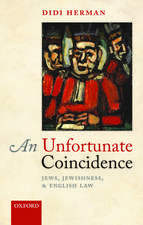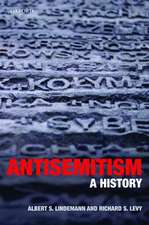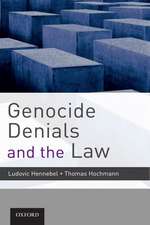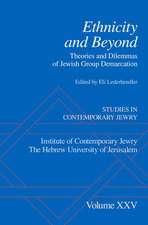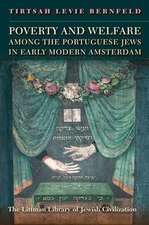Liberalism, Anti-Semitism, and Democracy: Essays in Honour of Peter Pulzer
Editat de Henning Tewes, Jonathan Wright Autor Politicsen Limba Engleză Hardback – 19 iul 2001
Preț: 361.16 lei
Preț vechi: 521.98 lei
-31% Nou
Puncte Express: 542
Preț estimativ în valută:
69.12€ • 71.89$ • 57.06£
69.12€ • 71.89$ • 57.06£
Carte tipărită la comandă
Livrare economică 01-07 aprilie
Preluare comenzi: 021 569.72.76
Specificații
ISBN-13: 9780198297239
ISBN-10: 0198297238
Pagini: 312
Ilustrații: 5 tables and 5 figures
Dimensiuni: 163 x 243 x 22 mm
Greutate: 0.63 kg
Editura: OUP OXFORD
Colecția OUP Oxford
Locul publicării:Oxford, United Kingdom
ISBN-10: 0198297238
Pagini: 312
Ilustrații: 5 tables and 5 figures
Dimensiuni: 163 x 243 x 22 mm
Greutate: 0.63 kg
Editura: OUP OXFORD
Colecția OUP Oxford
Locul publicării:Oxford, United Kingdom
Recenzii
All in all the Festschrift more than does justice to the academic excellence that Peter Pulzer showed throughout his long career ... a volume that is both eminently readable and is a fine testament to an excellent academic.
Stern's discussion of 'subtle silence' and the consequences this can have for the both liberalism and democracy is both well-argued and intellectually stimulating. He eloquently and persuasively guides the reader through the intrinsic difficulties a society has in understanding 'self', demonstrating that throughout the 20th century Germans, more so than most, remained silent at crucial times when finding their collective voice was called for.
Stern's discussion of 'subtle silence' and the consequences this can have for the both liberalism and democracy is both well-argued and intellectually stimulating. He eloquently and persuasively guides the reader through the intrinsic difficulties a society has in understanding 'self', demonstrating that throughout the 20th century Germans, more so than most, remained silent at crucial times when finding their collective voice was called for.

